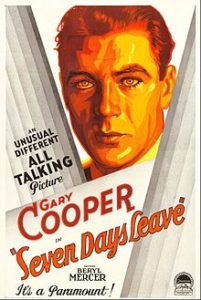Seven Days Leave ** (1930, Gary Cooper, Beryl Mercer, Daisy Belmore) – Classic Movie Review 10,176

The young Gary Cooper’s career was boosted when he starred in producer and director Richard Wallace’s 1930 all-talking drama film Seven Days Leave, the early-sound version of J M Barrie’s 1917 play The Old Lady Shows Her Medals.
Cooper plays Kenneth Downey, a young Canadian soldier recovering from his wounds in London after being wounded fighting in World War One, who comes under the protective wing of a Scottish elderly charwoman widow, Sarah Ann Dowey (Beryl Mercer), who believes he is her Scottish son so he agrees to pretend to be her son.
Seven Days’ Leave is a minor, schmaltzy, rather maudlin drama with very dated handling, as well as sound and vision technical problems arising from the then new talkie cameras.
But performances are still acceptable after all these years, with the young Cooper (who wears a kilt!) fresh and vibrant, maintaining a level of interest.
Beryl Mercer reprises her role from the original New York stage production, which premiered on 14 May 1917.
It was also made in a silent version for showing in cinemas without sound film equipment.
Also in the cast are Daisy Belmore as Emma Mickelham, Nora Cecil as Amelia Twymley, Tempe Pigott as Mrs Haggerty, Arthur Hoyt as Mr Willings, Arthur Metcalfe as Colonel, Basil Radford as Corporal, and Larry Steers as Aide-de-Camp.
Seven Days’ Leave [Medals] is directed by Richard Wallace, runs 80 minutes, is made by Paramount Famous Lasky Corporation, is released by Paramount Pictures (1930) (US), is written by John Farrow (adaptation), Dan Totheroh (adaptation) and Richard H Digges Jr (titles: silent version), is shot in black and white by Charles Lang, is produced by Louis D Lighton and Richard Wallace, is scored by John Leipold (composer: title music) and Frank Terry (music advisor), and designed by Bernard HerzbruIt.
It is shot in Paramount Studios, 5555 Melrose Avenue, Hollywood.
It was released on 25 January 1930 in the US.
© Derek Winnert 2020 Classic Movie Review 10,176
Check out more reviews on http://derekwinnert.com


